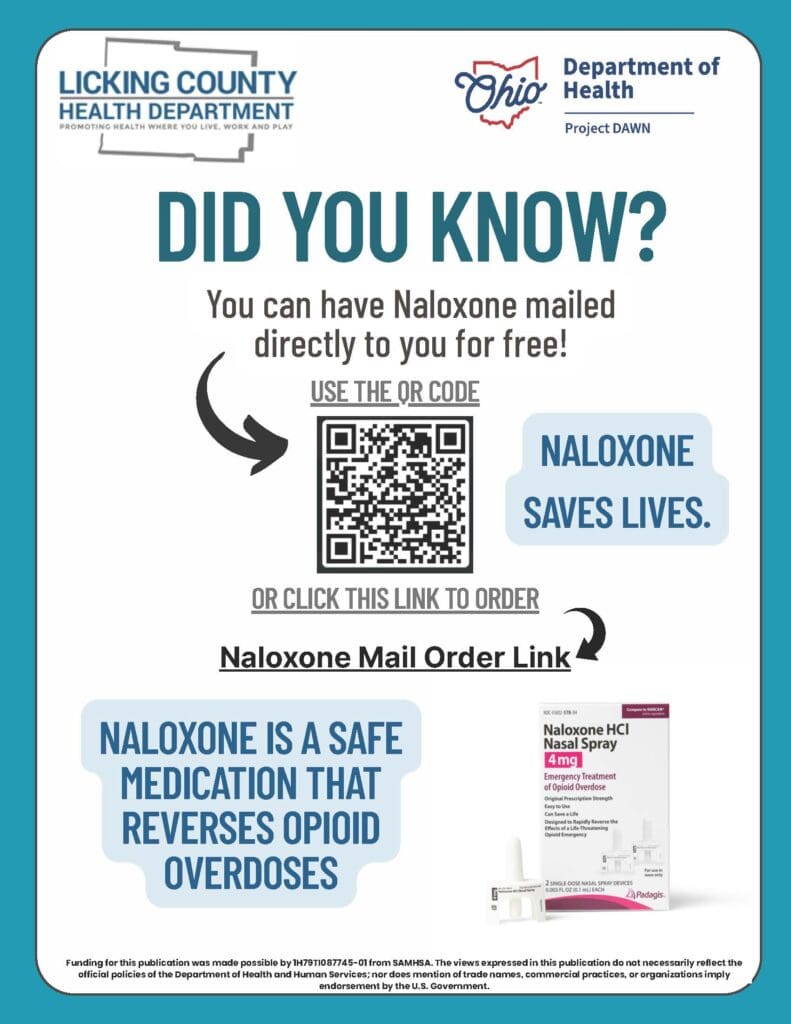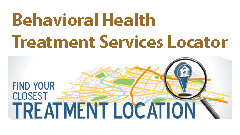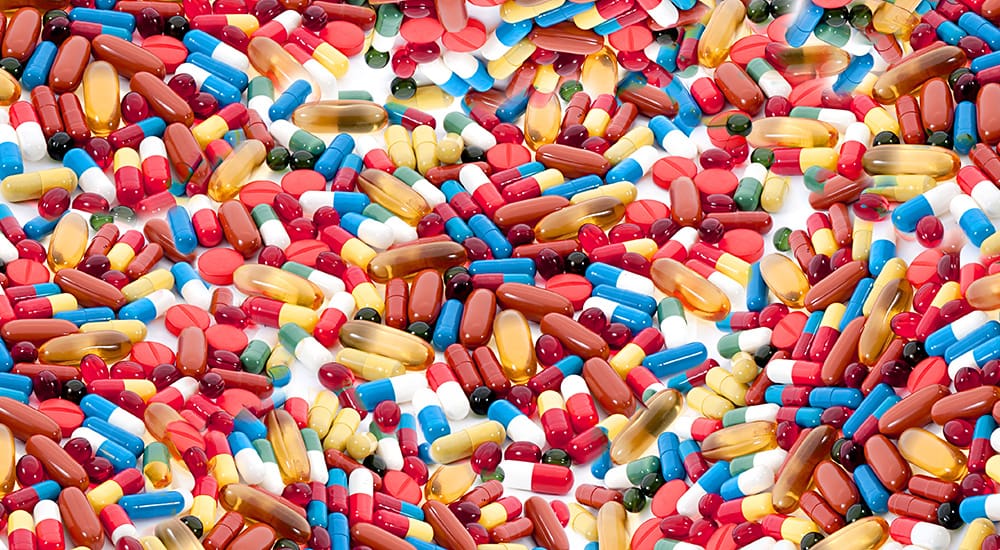Drug Overdose Prevention Programs
LCHD’s Drug Overdose Prevention (DOP) program works to implement comprehensive community-based efforts to address drug use and misuse through: coalition development, community needs assessment and evaluation, formation of an overdose fatality review, and development of policy, systems and environmental change strategies to address the issue.
Licking County now has an Overdose Spike Texting Alert System! Stay informed and text “LCoverdose” to 898211 for real-time alerts!
Project DAWN
Deaths Avoided With Naloxone (NARCAN®)
Project DAWN is a community-wide naloxone (also known as NARCAN®) distribution program. Naloxone is a medication that can be used to reverse an overdose caused by an opioid drug.
The project educates individuals who use opioids, their family, and their friends on how to recognize the signs and symptoms of a drug overdose and how to administer Naloxone (NARCAN®).
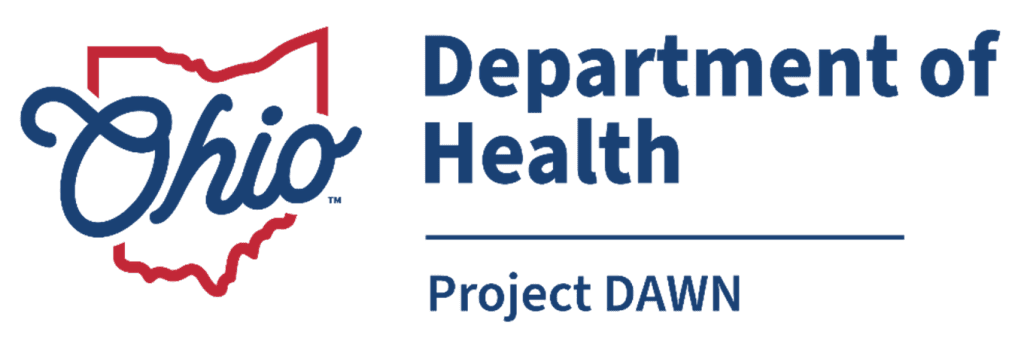
Agencies and organizations that distribute Naloxone:
- Licking County Health Department
675 Price Road, Newark, OH 43055 - Behavioral Healthcare Partners
65 Messimer Drive, Newark, OH 43055 - Family Health Services
100 McMillen Drive, Newark, OH 43055 - Genoa Pharmacy
65 Messimer Drive, Newark, OH 43055 - Licking County Alcoholism Prevention Program (LAPP)
62 E Stevens Street, Newark, OH 43055 - Shepherd Hill
200 Messimer Drive, Newark, OH 43055
Project DAWN Naloxone Training Videos:
Undoing Stigma
Substance Use Disorder (SUD)
A substance use disorder (SUD) is a medical illness which ranges from mild to severe and from temporary to chronic. A SUD develops when continued misuse of a drug changes the brain and causes health problems and failure to meet responsibilities at work, school, or home. The DOP program is also working to reduce the stigma that often surrounds substance use disorders.
Drug and Alcohol Treatment Services in Licking County
- Behavioral Health Services: (740)-522-8477, 65 Messimer Dr, Newark, OH 43055
- Shepherd Hill: (220) 564-HEAL (4325), 200 Messimer Drive
Newark, OH. - Licking County Alcoholism Prevention Program (LAPP): (740)-366-7303, 62 East Stevens St. Newark, OH 43055
- Brightview: (833)-510-4357, 1445 West Main Street, Newark, OH 43055
- Mid-Ohio Psychological Services, Inc.: (740)-281-1777, 68 W Church St, 3rd Floor, Suite 300, Newark, OH 43055
Drug and Alcohol Treatment Services that serve Licking County Residents
- Columbus Springs: (614)-300-9100, 2085 Citygate Dr. Columbus, OH (male and female)
- Cedar Ridge Behavioral: (855)-692-7247, 841 Steubenville Ave. Cambridge, OH
- Maryhaven: (614)-445-8131, 1791 Alum Creek Dr. Columbus, OH 43207
- Muskingum Valley Health Centers: (740)-891-9000, 716 Adair Avenue Zanesville, OH 43701
- Perry Behavioral Health Choices: (740)-342-1991; 203 North Main Street New Lexington, OH 43764-1264
- Village Network: (740)-788-8850, 14 Sandalwood Drive Newark, OH 43055
Prescription Drugs and Sharps Disposal
Medicines play an important role in treating certain conditions and diseases, but they must be taken with care. Secure storage and safe disposal of pain medications, antidepressants, and other expired or un-needed medications reduces the risk of misuse by children or others. For a $5.00 fee, the Licking County Health Department accepts normal sized sharps containers for disposal from households.
LCHD cannot accept any medications for disposal.
Under Ohio law, only law enforcement agencies and pharmacies can be prescription drug drop off locations. Drug Take Back Days are offered twice a year in April and October, but it is best to dispose of unused drugs throughout the year by visiting a drop off location.
In Licking County the following locations accept pills, however, they do not accept liquid medications or sharps.
- Licking County Sheriff’s Office, 155 E Main Street, Newark, Ohio 43055
- Newark Police Department, 39 S. 4th Street, Newark, Ohio 43055
- Pataskala Police Department, 623 W. Broad Street, Pataskala, Ohio 43062
- Johnstown Police Department, 599 D. Main St., Johnstown, Ohio 43031
- Hebron Police Department, 934 W. Main St., Hebron, Ohio 43025
- Heath Police Department, 1287 Hebron Rd., Heath, Ohio 43056
Learn more about at-home medication disposal here:
Disposal options for specific medications:
- Small amounts of most medications can either be disposed of by mixing the medication with solid waste, or by flushing the medication down the drain.
Disposal options for household generated sharps:
- Small quantities of syringes from personal use can be disposed of with your solid waste. Guidelines suggest placing used needles in a household container such as a laundry detergent bottle, bleach bottle, or a sturdy, opaque plastic container with a screw-top lid. When the container is 3/4 of the way full, seal the lid with duct tape, label “SHARPS” and “DO NOT RECYCLE” and place container in your regular trash. Find further instructions at the link above.
- Deterra Medication Disposal Pouches are available as supplies last at the Licking County Health Department. Call 740-349-6535 and ask for our Drug Overdose Prevention program.
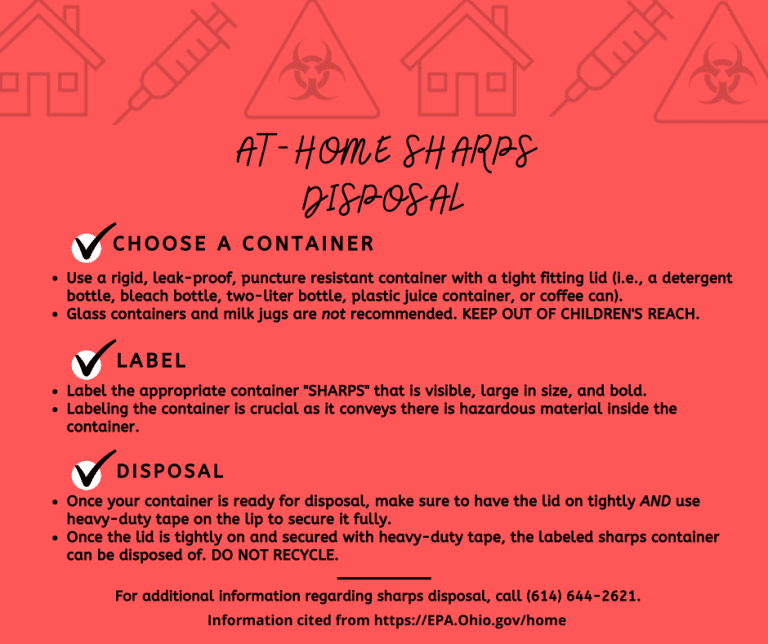
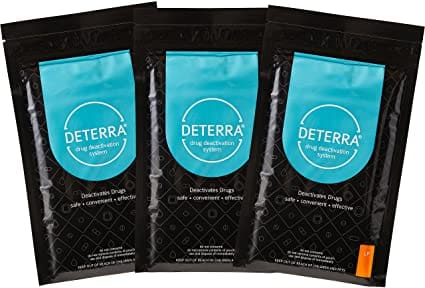
Other Resources

- Pathways of Central Ohio 2-1-1 Crisis Hotline and Information Center/Resource Directory
- Mental Health and Recovery for Licking and Knox Counties
- Mental Health America of Licking County
- Licking County Overdose Fatality Data
- Narcotics Anonymous Meetings
- Ohio Department of Mental Health and Addiction Services
- National Institute on Drug Abuse (NIDA)
- Newark Homeless Outreach

